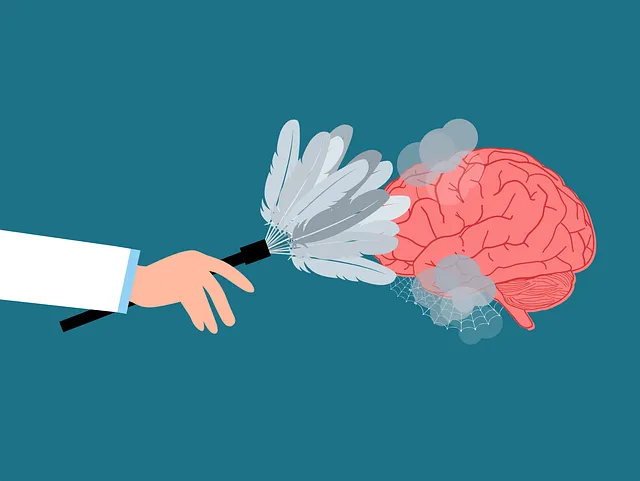Group facilitation using resources like the Lakewood Kaiser Permanente behavioral health phone number significantly improves mental health support. Facilitators create safe spaces, encouraging open dialogue and active sharing of experiences through techniques like Social Skills Training. Active listening, structured activities, and crisis intervention strategies promote emotional healing, foster community, and normalize self-care practices, ultimately enhancing overall well-being.
“Explore effective mental wellness group facilitation techniques, essential tools in enhancing behavioral health support. Learn how facilitators at Lakewood Kaiser Permanente play a pivotal role in fostering safe spaces through building trust and active listening skills. Discover crisis intervention strategies and self-care practices for both leaders and members. Uncover the impact of these techniques, reflecting improved peer connections and overall well-being.”
- Understanding Group Facilitation Role in Mental Health Support
- Building Trust: Techniques for Safe Space Creation
- Active Listening Skills: Enhancing Peer Connection
- Crisis Intervention Strategies for Facilitators
- Promoting Self-Care for Group Leaders and Members
Understanding Group Facilitation Role in Mental Health Support

Group facilitation plays a pivotal role in enhancing mental health support, particularly when coupled with resources like the Lakewood Kaiser Permanente behavioral health phone number. As a group facilitator, one acts as a guide, creating a safe and supportive environment where individuals can share their experiences, learn from each other, and develop coping strategies. This dynamic approach goes beyond individual therapy, fostering a sense of community that’s crucial for emotional healing processes.
By facilitating open dialogue and encouraging active participation, facilitators facilitate the exchange of diverse perspectives and promote understanding. Techniques such as Social Skills Training can be incorporated to enhance communication and interpersonal relationships, contributing to improved mental wellness. Furthermore, these group sessions cater to the growing public awareness campaigns development around mental health, offering a collective platform for education, support, and advocacy.
Building Trust: Techniques for Safe Space Creation

Creating a safe and supportive space is paramount to effective group facilitation, especially when addressing sensitive mental wellness topics. Facilitators at Lakewood Kaiser Permanente behavioral health phone number understand the significance of building trust among participants to encourage open dialogue and emotional vulnerability. One powerful technique involves establishing clear ground rules from the outset, ensuring every member feels heard and respected. This includes fostering active listening, promoting non-judgmental environments, and maintaining confidentiality.
Additionally, incorporating structured activities that foster resilience building and inner strength development can help create a sense of safety. These might include guided meditations, mindfulness exercises, or group reflections designed to normalize shared experiences. By implementing these strategies, facilitators can cultivate an atmosphere where individuals feel empowered to explore their mental health journey together, ultimately enhancing the therapeutic benefits of group settings.
Active Listening Skills: Enhancing Peer Connection

In facilitating mental wellness groups at Lakewood Kaiser Permanente behavioral health phone number, active listening skills play a pivotal role in enhancing peer connections. Facilitators who employ empathetic and attentive listening techniques foster an environment where group members feel heard and understood, leading to deeper interactions and meaningful conversations. This approach not only encourages open dialogue but also strengthens the therapeutic bond among participants, making them more receptive to one another’s experiences and perspectives.
Through active listening, facilitators can implement empathy-building strategies that promote effective communication. By reflecting back what group members say and asking clarifying questions, facilitators demonstrate a genuine interest in their well-being. This, in turn, inspires members to share their thoughts and feelings more openly, benefiting from the collective support and understanding within the group setting. Incorporating self-awareness exercises further reinforces these positive dynamics, helping individuals recognize and articulate their emotions, thereby enriching both personal growth and peer connections.
Crisis Intervention Strategies for Facilitators

Crisis Intervention Strategies for facilitators play a pivotal role in supporting individuals navigating mental health challenges, especially when reaching out to resources like the Lakewood Kaiser Permanente behavioral health phone number. These strategies are designed to provide immediate, targeted support during acute distress or crisis situations. Facilitators should be adept at assessing the individual’s situation, ensuring their safety, and offering practical solutions. One effective method is active listening, where facilitators pay close attention to the client’s concerns, validating their emotions, and reflecting their experiences.
Encouraging open dialogue and fostering a non-judgmental environment are essential for facilitating emotional healing processes. Additionally, facilitators can guide clients towards Self-Care Routine Development for Better Mental Health by teaching stress reduction methods. Techniques such as deep breathing exercises, mindfulness practices, or cognitive reframing can empower individuals to manage their crises more effectively. By integrating these strategies into group sessions, facilitators contribute to the overall well-being of participants, ensuring they have the tools needed to navigate life’s challenges with resilience and improved emotional healing capabilities.
Promoting Self-Care for Group Leaders and Members

In facilitating mental wellness groups, prioritizing self-care is paramount for both group leaders and members. Group leaders, often caught up in the demand for their expertise, must be encouraged to practice what they preach. This means integrating confidence-boosting techniques into their own routines to avoid burnout. At Lakewood Kaiser Permanente behavioral health phone number, professionals emphasize emotional intelligence as a key component of self-care; leaders who understand and manage their emotions can more effectively support others.
Regular Self-Awareness Exercises are another vital tool. These can range from journaling practices that allow individuals to process their thoughts and feelings, to mindfulness meditations that foster a deeper connection with the present moment. By encouraging both leaders and members to engage in these activities, mental wellness groups create an environment where self-care is normalized and valued, ultimately enhancing the quality of interactions and support within the group.
Group facilitation plays a pivotal role in enhancing mental wellness, creating safe spaces, and fostering peer connections. By employing techniques discussed, such as building trust, active listening, crisis intervention, and self-care practices, facilitators at organizations like Lakewood Kaiser Permanente behavioral health can significantly improve the well-being of both group leaders and members. Remember that reaching out for support through phone numbers like the Lakewood Kaiser Permanente behavioral health line is a sign of strength, and proper training in facilitation techniques ensures effective and compassionate care.






